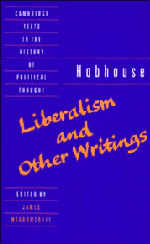Book contents
- Frontmatter
- Contents
- Acknowledgements
- Introduction
- Principal events in the life of L. T. Hobhouse
- Further reading
- Biographical notes
- Liberalism
- Chapter I Before Liberalism
- Chapter II The Elements of Liberalism
- Chapter III The Movement of Theory
- Chapter IV ‘Laissez-faire’
- Chapter V Gladstone and Mill
- Chapter VI The Heart of Liberalism
- Chapter VII The State and the Individual
- Chapter VIII Economic Liberalism
- Chapter IX The Future of Liberalism
- Other Writings
- Index
- Title in the series
Chapter VIII - Economic Liberalism
Published online by Cambridge University Press: 05 June 2012
- Frontmatter
- Contents
- Acknowledgements
- Introduction
- Principal events in the life of L. T. Hobhouse
- Further reading
- Biographical notes
- Liberalism
- Chapter I Before Liberalism
- Chapter II The Elements of Liberalism
- Chapter III The Movement of Theory
- Chapter IV ‘Laissez-faire’
- Chapter V Gladstone and Mill
- Chapter VI The Heart of Liberalism
- Chapter VII The State and the Individual
- Chapter VIII Economic Liberalism
- Chapter IX The Future of Liberalism
- Other Writings
- Index
- Title in the series
Summary
There are two forms of Socialism with which Liberalism has nothing to do. These I will call the mechanical and the official. Mechanical Socialism is founded on a false interpretation of history. It attributes the phenomena of social life and development to the sole operation of the economic factor, whereas the beginning of sound sociology is to conceive society as a whole in which all the parts interact. The economic factor, to take a single point, is at least as much the effect as it is the cause of scientific invention. There would be no world-wide system of telegraphy if there was no need of world-wide inter-communication. But there would be no electric telegraph at all but for the scientific interest which determined the experiments of Gauss and Weber. Mechanical Socialism, further, is founded on a false economic analysis which attributes all value to labour, denying, confounding or distorting the distinct functions of the direction of enterprise, the unavoidable payment for the use of capital, the productivity of nature, and the very complex social forces which, by determining the movements of demand and supply actually fix the rates at which goods exchange with one another. Politically, mechanical Socialism supposes a class war, resting on a clear-cut distinction of classes which does not exist.
- Type
- Chapter
- Information
- Hobhouse: Liberalism and Other Writings , pp. 81 - 102Publisher: Cambridge University PressPrint publication year: 1994

